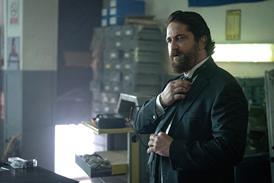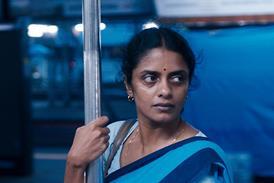EXCLUSIVE: Festival director Dieter Kosslick plans further expansion of Berlin’s European Film Market (EFM); first prizes awarded; World Cinema Fund in the spotlight.
Speaking exclusively to Screen ahead of this year’s Golden Bear awards ceremony, Kosslick said: “We have to be proactive concerning the market because this year has shown that the EFM has evidently now become interesting as a platform for major productions.”
He revealed that it is intended “to continue showing quality TV series like Jane Campion’s Top Of The Lake and to integrate them into the market and create a platform for this kind of production.”
Kosslick also highlighted the need for more screens and said: “The biggest challenge for the market is that we need more cinemas - especially for the market.
“We have more than 1,000 screenings, so we need more cinemas, but there’s always a light at the end of the tunnel: if all goes well, we will have Zoo Palast next year with five screens and could perhaps locate a whole segment of the market there. Then we could satisfy all of the requests for screening slots.”
“Moreover, we will consider a redistribution of the stand space next year as there are companies who want to come back to the Martin Gropius Bau because they see how it works.”
Co-director hunt
Kosslick said that the search will now begin for a co-director for the EFM to work with Beki Probst after Catherine Buresi decided not to extend her contract last year.
“Straight after the Berlinale, we will advertise internationally for the post of the EFM co-director,” he declared.
“I don’t already have anyone particular in mind for the post, but I expect there to be quite a response.”
Talent
Speaking about his personal highlights at this year’s festival, Kosslick cited the presentation of the Honorary Golden Bear to Claude Lanzmann, the first time this has been given by the Berlinale to a documentary film-maker.
He was also cheered by the fact that “we didn’t have a single cancellation [by the invited talent]. We have never had so many celebrities and talent in Berlin before, as many were promoting new projects.”
Kosslick added: “We had only minimal technical problems, which is really impressive when you know what goes on behind the scenes for the digital projection. That’s all down to the great staff we have handling the technical side“.
Moreover, “the enthusiasm of the general cinema-going public really impressed the guests from Hollywood and I had many emails from the stars to say that Berlin is unbeatable”.
Indeed, the festival reported – similarly to last year – that around 250,000 tickets had been sold by the midpoint of the 11-day event.
Neumann defends Kosslick
Germany’s State Minister for Culture, Bernd Neumann, leapt to the defence of Kosslick following criticism of this year’s programme.
“Dieter Kosslick is a professional and puts his heart and mind into his job. I stand by him unreservedly,” Neumann told local tabloid B.Z.
“He is among the best and most esteemed of the world’s festival directors. That doesn’t mean that one has like the film selection in individual cases.”
Neumann dismissed calls for the appointment of an artistic director to work alongside Kosslick
“Dieter Kosslick has a distinct expertise about films, he has great competence and a first-rate team. Why should one then appoint an artisitic director?,” Neumann asked.
“There will always be criticism about the competition films, but those are individual cases. His contract was rightly extended [to 2016]. Kosslick is a godsend for Berlin’s cultural landscape.“
First prize-winners
The Berlinale has served as the venue for various prize-giving ceremonies across this week.
Berlin-based DEFA Foundation announced the winner of its newly created Heiner Carow Award which is presented to a feature film, documentary or film essay screening in the Berlinale’s Panorama.
The Award went to Angela Christlieb’s documentary Naked Opera produced by Amour Fou Luxembourg and Heimatfilm and handled internationally by Autlook Film Sales.
In addition, writer-director Chris Kraus was named the winner for the second time of the $33,500 (€25,000) Thomas Strittmatter Screenplay Award for the script to his next feature the tragicomedy Die Blumen von gestern (working title).
Kraus had previously received the award for Four Minutes, which attracted more than half a million cinema-goers in Germany.
Die Blumen von gestern will be produced by Four Minutes Filmproduktion and shot in Stuttgart and Ludwigsburg.
World Cinema Fund
The festival’s World Cinema Fund (WCF) had two funded productions in the Berlinale programme: Emir Baigazin’s Harmony Lessons, which is the first film from Kazakhstan to screen in the Berlinale Competition, and Mexican José Luis Valle’s Workers, showing in the Panorama.
In a discussion on film-making in Vietnam and Cuba, producer-director Hoang Diep Nguyen revealed that her directorial debut Flapping In The Middle Of Nowhere will begin shooting in Hanoi this June as a co-production between her company VBlock Media with France’s Ciné-Sud Promotion, Norway’s Film Farms, and Germany’s Filmallee, with backing from the WCF, CNC’s Aide aux Cinémas du Monde and the Global Film Initiative.
Filmallee’s David Lindner, who has his latest production Anatomy Of A Departure screening in Perspektive Deutsches Kino on Sunday (Feb 17), told Screen that he had first met Nguyen at the Far East Film Festival in Italy’s Udine when they both participated in the EAVE Ties that Bind - Europe/Asia workshops in 2011.
Rather than shooting the story of a teenage girl becoming pregnant in a grainy, documentary style, Nguyen is aiming for a “highly aesthetic visual language that will give the film a certain sensuality,” Lindner explained.




















No comments yet